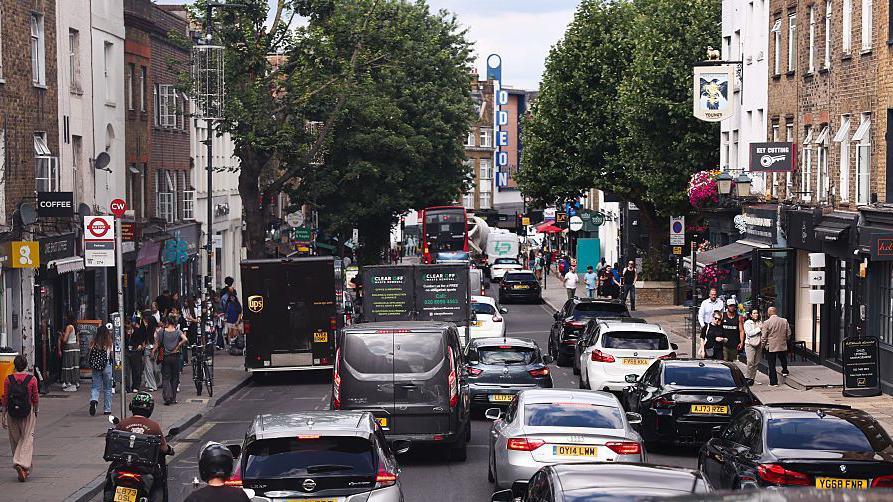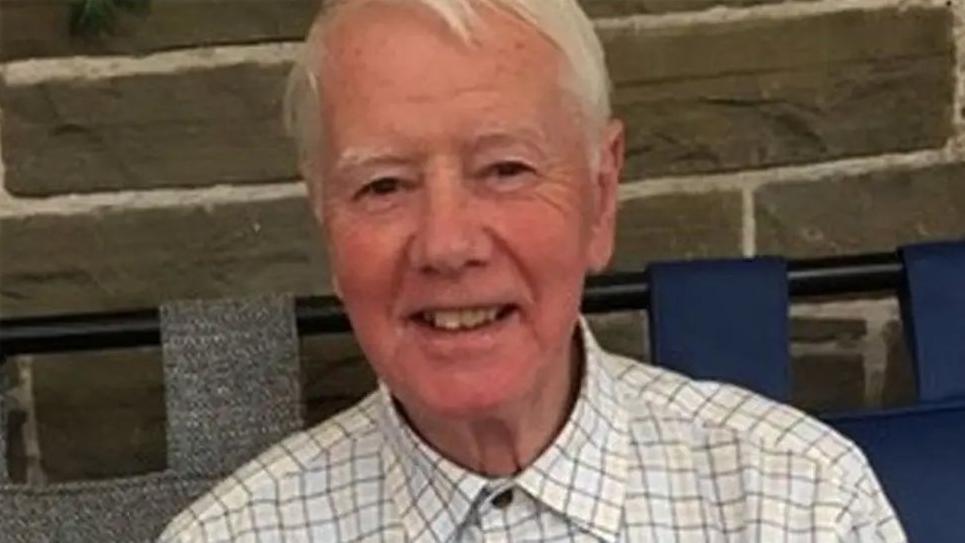Over-70s face driving ban for failing eye tests

- Published
Motorists over 70 could be banned from the roads if they fail compulsory eye tests under a radical shake-up of driving laws in Great Britain.
Plans also include reducing the drink-driving limit in both England and Wales to be in line with Scotland's laws, and giving people points on their licence for not wearing a seatbelt.
The move comes after an inquest into four deaths caused by drivers with failing eyesight saw a coroner call the UK's licensing system the "laxest in Europe".
The changes are expected to be included in a new road safety strategy set to be published by the government in the autumn, with ministers believing that the current safety messaging is not working.
"In no other circumstance would we accept 1,600 people dying [on the roads each year], with thousands more seriously injured, costing the NHS more than £2bn per year," a government source told the BBC.
"This Labour government will deliver the first Road Safety Strategy in a decade, imposing tougher penalties on those breaking the law, protecting road users and restoring order to our roads," the source added.
Conservative leader Kemi Badenoch has said she supports the plans to bring in compulsory eye tests for drivers over 70.
"I think we need to make sure that people driving on our roads and using our streets are safe," she said.
In April, HM Senior Coroner for Lancashire Dr James Adeley sent a report to Transport Secretary Heidi Alexander to say action should be taken to prevent future deaths, after he found enforcement of visual legal standards for drivers was unsafe.
Following the inquest, a source close to the transport secretary told the BBC the government accepted that the rules "need to be reassessed".
The UK is one of only three European countries to rely on self-reporting of visual conditions affecting the ability to drive.
Now, a new requirement being prepared by the transport secretary could make eye tests for the over-70s compulsory when they renew their driving licence every three years.
However, Peter Browne, 73, from Great Yarmouth, told the BBC that he has tried to get an appointment to get his sight checked but is unable to get one.
He says he has glaucoma and has reported it to the DVLA but that he has not stopped driving.
"I'm quite frustrated," he said. "If it was found that my eyesight was not of sufficient level to drive, would it be my fault or the NHS for not being able to give me an appointment?"
Edmund King, president of the AA, defended drivers like Peter over the age of 70, saying they "are still relatively safe" - although acknowledged bringing in a compulsory eye test was "a small price to pay" for safety.
"When you look at road deaths the big peaks are with young, new drivers and then older drivers - although older drivers it does tend to be those over 80 and 85," he told BBC Radio 4's Today programme.
Quoting statistics from road safety charity Brake, external, Mr King added that "one in five young drivers crash in their first year" and over "1,500 young drivers are killed or are seriously injured each year".
Drink-driving limit
Also under consideration by the government are potential medical tests for conditions like dementia, and stricter rules for drink-driving.
Currently those diagnosed with dementia, external are asked to self-report their condition to the DVLA which will make a decision based on medical records and a questionnaire.
Under the new plans, first reported in the Times, the drink-drive limit is expected to be tightened from 35 micrograms of alcohol per 100 millilitres of breath to 22 micrograms.
This would match limits already set for Scotland, which were lowered in December 2014 following an independent review of Drink and Drug Driving Law.
Despite the lower limit, joint research from academics at the University of Bath and University of Essex found it "had no impact on any type of road accident, from fatal crashes to collisions". It did, however, find the reform led to a greater anti-drink driving sentiment among the public.
Other government proposals include police being allowed to rely on roadside saliva tests for evidence of drug-driving rather than blood tests, making it easier to prosecute suspects.
Depending on the specifics of each policy area and devolution agreements in place, these changes, if passed, may apply to all of Great Britain, or to just England and Wales, or only to England.
Justice minister, Alex Davies-Jones, told BBC Breakfast this was the biggest shake up to the UK's driving laws "for decades", but stressed the proposed changes remain part of a consultation process.
She also reiterated that the government is not currently looking at the introduction of graduated licenses for young drivers - something many bereaved parents have called for - saying that it could potentially "over-target younger drivers and unfairly discriminate against them".
The government "will keep everything under review", she added.
'Ineffective, unsafe and unfit'
Earlier this year, coroner Dr Adeley criticised the current system for enforcing visual legal standards as "ineffective, unsafe and unfit" to meet the needs of society.
He made the remarks at the inquests of Marie Cunningham, 79, Grace Foulds, 85, Peter Westwell, 80, and Anne Ferguson, 75, at Preston Coroner's Court - all of whom were killed by drivers with failing eyesight.

Grace Foulds and Marie Cunningham were crossing the road when they were struck by a 68-year-old driver who had been repeatedly told he was unfit to drive over a 10-year period
Current rules mean everyone aged over 70 must renew their driving licence, and update their photograph, every three years.
When you renew, the government says you must tell the DVLA if you have a problem with your eyesight - although this does not include being short-sighted, long-sighted or colour blind.
Rob Heard, founder of Older Drivers Forum and an ex-roads policing officer said he had attended over 300 fatalities in his career and had witnessed first-hand the ripple-effect these incidents have on so many people.
"All of the new recommendations that are coming out are good," he said, adding that he supports "compulsory eye sight testing for all ages".
Kay Hine, 75, in Perthshire used to have an opticians practice and agrees that everyone, regardless of age, should ensure their eyesight is at the right standard for driving.
"It's imperative that people prove that can see," she said.
"Everyone who drives should hold a 'proof of eyesight standard' or 'vision fitness to drive' from a recent eye examination as they do in most European countries."
Additional reporting by Rozina Sini.
Get in touch
Have you been affected by the issues raised in this story? Get in touch

Sign up for our Politics Essential newsletter to keep up with the inner workings of Westminster and beyond.
Related topics
- Published18 April

- Published29 April
